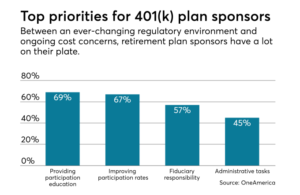Wrong assumptions plan sponsors make
“My plan only has $3 million in it. How much ERISA exposure could we have?”
This question from a client who wondered whether it was worth the cost of putting in written plan policies and controls got me to thinking about why this misconception is so common. Small plan violations can result in very large ERISA penalties. For example, the DOL’s penalty just for failure to file Form 5500 could be $2,140 per day.
This question got me to thinking about other common misconceptions that can get sponsors of plans of all sizes into big trouble. Here is my list of the most popular mistaken assumptions:
1. My vendor is taking care of everything. I don’t need to check what they’re doing.
Why it’s wrong: Your vendor is probably not a fiduciary. Your service agreement probably says that your vendor isn’t responsible for legal compliance, as well. That means that you, as a company fiduciary, are responsible for the failure of vendor’s employees to comply with the rules. Even if your vendor is a fiduciary, you are not completely off the hook. You have an obligation to prudently select and monitor fiduciaries.
2. Nobody is interested in auditing my plan. Only the largest plans get audited.
Why it’s wrong: A number of events can trigger an audit notice, including complaints by employees and answers on your Form 5500. Some audit targets are also selected at random. Even if you are not targeted for an employee plan audit, IRS corporate auditors will ask to see plan documents and 5500s and will call in a benefit specialist and expand the audit if they have concerns about what they have reviewed.
3. I can ignore that participant who is complaining. Participants should be grateful they have a plan at all.
Why it’s wrong: Dissatisfied employees can file complaints that trigger a government audit or can file lawsuits that are expensive and time consuming, even if you win. Always try to answer their questions and explain clearly the reasons for any benefit denials.
4. Surely the IRS and the DOL will give me credit for good intentions even if I get things wrong.
Why it’s wrong: A famous quote from an ERISA decision many years ago summed it up: “A pure heart and an empty head are not enough.” The IRS and DOL expect complete compliance, not near compliance or well-intentioned attempts at compliance that miss the mark. You will not be given a free pass if you are caught in violations of rules you should have known about.
5. I can go it alone. Hiring outside advisers is too expensive.
Why it’s wrong: Fiduciaries must satisfy a “prudent expert” standard. If you are not an investment expert, you are required to consult someone who is. Just as you wouldn’t try to write your own will without the help of a lawyer, you should not try to manage your own plan without the help of a knowledgeable vendor. For maximum protection, you can hire fiduciary administrators and investment managers with the discretion to make plan decisions. Keep in mind, though, that you will still be responsible for prudently hiring and monitoring these people. And having your attorney review procedures, amendments and communications to make sure that increasingly complicated rules are satisfied saves money in the long run. Your potential penalties will be much higher than the cost of your attorney’s services.
If you or your plan sponsor share these misconceptions about avoiding ERISA audits, we have two words of advice: Think again.

